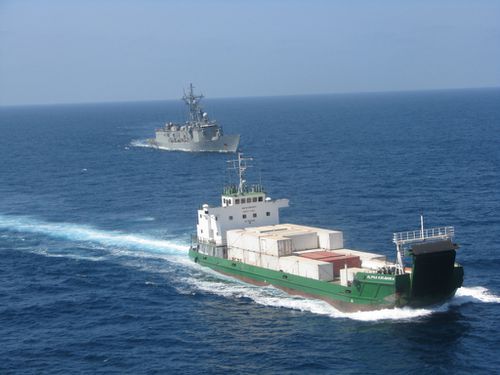18 months after the start of Atalanta (3). A final review

(BRUSSELS2 to Northwood and Brussels) After 18 months of presence in the Gulf and the Indian Ocean, here is a final assessment of the European anti-piracy operation Eunavfor Atalanta. An operation that has evolved at the tactical level and now takes place in "offensive mode“, even if the delivery to justice of the arrested pirates is currently marking time.
18 months after the start of Atalanta (2): the return to justice stalls
Humanitarian support: flawless
This is an aspect often overlooked when taking stock of piracy, but oh so essential. Around 30% of EUNAVFOR Atalanta's forces are devoted to this first aspect of European action - the protection of the WFP and AMISOM boats which are escorted from end to end, from Kenya to Somalia. 72 WFP boats were escorted in this way. This made it possible to deliver 364.118 tonnes of food aid to Somalia, as well as 42 ships supplying AMISOM.
None were attacked. On-board protection teams (VPD) are on board. And it's effective, according to John Harbour, EUNAVFOR's spokesperson: " This allows you to have a first reaction and to wait for the arrival of the helicopter which is there quickly. Usually that's enough to scare them away. ". However, this requires the authorization of the flag State (that of WFP or AMISOM is not sufficient). Framework agreements have been signed with certain countries. But for Panama, for example, an agreement is needed each time.
In the Gulf of Aden, a refined "corridor" tactic
In the Gulf of Aden, the prevention of acts of piracy is carried out using two techniques which operate differently depending on the nation.
The "corridor" technique was chosen by EUNAVFOR and implemented with the other multinational forces (NATO, CTF) present. The principle is not to escort the boats but each of the warships monitoring a specific area, a box. Merchant ships passing under surveillance from one box to another. Which is enough to intervene if the merchant ship has used the "good practices" in force to resist. Each of the participants takes turns coordinating the action in the corridor. Comment from a European officer: Pirates do not attack or if attacking warships are quickly ready to intervene. Catches are rare. As Rear Admiral Hudson, commanding Operation Atalanta, recalled, the " resurgence of the last successful attacks at the end of 2009 is often due to the non-respect of some of the recommendations of good maritime practices ».
Other nations (Russia, China, India) use the old technique of the convoy escorted by military ships which is " longer and more restrictive for merchant ships (there must be an assembly point) and not automatically more efficient, the pirates waiting for the last or the lonely to attack. The past has proven it remarks a European officer.
Note: the reversal of China, which decided to become fully involved in multinational cooperation and applied to join the IRTC corridor system.
In the Somali basin, the "containment" strategy
In the Somali basin, the principle is the neutralization of pirate groups and the destruction of mother ships (cf. offensive mode). In summary, since the start of the European operation EUNAVFOR Atlanta, there have been 74 successful attacks by pirates and 170 foiled out of a total of 244 officially recorded attacks, i.e. a "success rate" for pirates of 1 out of 3. Currently , there remain 18 ships under the control of Somali pirates and 393 crew members hostage.
A balance sheet that may seem bitter. But, on the military side, we are realistic, we know very well that whatever tactic is used, the solution lies elsewhere, as the officers told me almost unanimously. " The action at sea just allows to limit as much as possible the facts of piracy, the solution is elsewhere, on land »